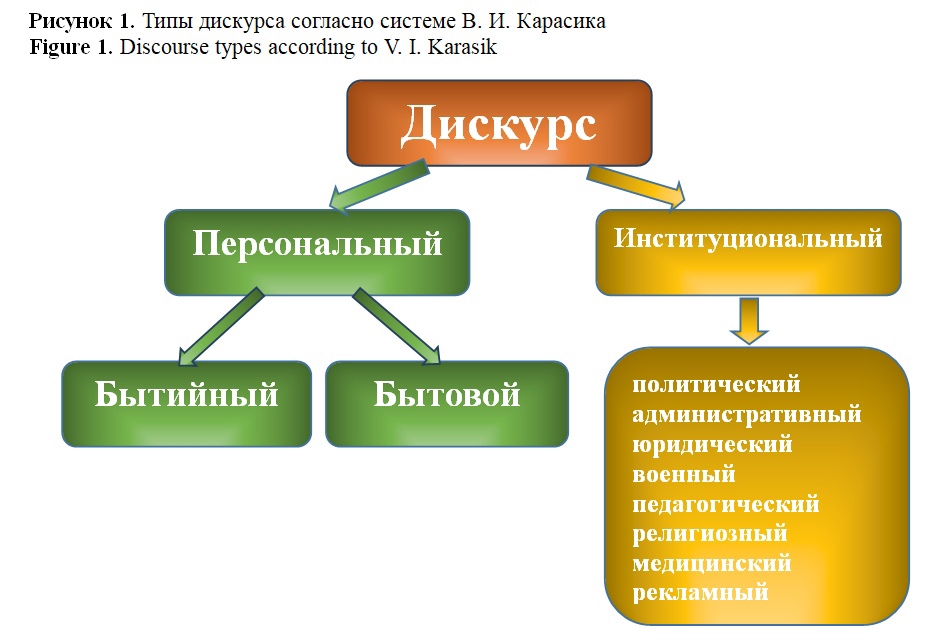Institutionality of discourse as a methodological problem
Institutionality of discourse, as one of the key concepts of modern discourse analysis and an integral property of a number of discourse types, often poses a research problem of practical and/or methodological character. The dynamics of discourse and its social nature do not always fit into the framework of institutionality, extending it or even transgressing it. Apart from general methodological problems, the researcher often encounters cases of deliberate violation of written and unwritten rules of communication. Such examples, however, not only represent an issue, but also grant the possibility of looking at the problem of institutionality from a different angle. The article considers the problems of the methodology of institutional discourse associated, on the one hand, with the uncertainty (or an insufficiently clear definition) of a number of concepts and types of discourse, and on the other hand, with shifts of status and roles of communicants. It might seem that such shifts make the principle of institutionality rather volatile. Our study shows, however, that functionally all the institutional properties of discourse stand and even serve as a tool for manipulation. We consider examples of such violations that present a methodological issue and hamper practical discourse research. It is shown that a formal classification of discourse types via corresponding social institutions, despite its simplicity, tends to produce a number of issues including the overlapping of several types of discourse in one discursive act or difficulties in attributing it to any particular type due to changes in the communicative tactics of participants.
Figures

Amatov, A. M., Kurash, S. B., Danilova, E. S. (2024). Institutionality of discourse as a methodological problem, Research Result. Theoretical and Applied Linguistics, 10 (3), 4-25. DOI: 10.18413/2313-8912-2024-10-3-0-1


















While nobody left any comments to this publication.
You can be first.
References
Amatov, A. M., Svishchev, G. V. (2023). Chetvertaya vlast pyatoi respubliki: diskurs na grani institutsionalnosti [The Fourth Power of the Fifth Republic: Discourse on the Verge of Institutional Status], in Tekst. Iazyk. Chelovek, MGPU, Mozyr’, Belarus, 187–193. (In Russian)
Karasik, V. I. (2000a). O tipakh diskursa, in Yazykovaya lichnost: institutsionalny i personalny diskurs [On Types of Discourse], Peremena, Volgograd, Russia, 5–20. (In Russian)
Karasik, V. I. (2002). Yazykovoy krug: lichnost, kontsepty, diskurs [Language Circle: Personality, Concepts, Discourse], Peremena, Volgograd, Russia. (In Russian)
Karasik, V. I. (2000b). Etnokulturnye tipy institucionalnogo diskursa, in Ethnocultural specificity of speech activity, Moscow, Russia, 19–31. (In Russian)
Makarenko, A. S. (2019). Kniga dlya roditelei [The Book for Parents], AST, Moscow, Russia. (In Russian)
Nefedova, G. M. (2017). Spetsifika integratsii formalnogo, neformalnogo i informalnogo obrazovaniya, Nauchno-pedagogicheskoe obozrenie. Pedagogical Review, 2017 (3), Tomsk, Russia, 127–132. (In Russian)
Ostrazhkova, N. S. (2004). Teaching Understanding of the Essence of Pedagogical Discourse in a Lecture: English College Course, Abstract of Ph.D. dissertation, Tambov, Russia. (In Russian)
Prokhorov, Yu. E. (2006). Deistvitelnost. Tekst. Diskurs [Reality. Text. Discourse], Flinta: Nauka, Moscow, Russia. (In Russian)
Tlenkopacheva, M. N. (2019). Osobennosti rechevogo povedeniya uchastnikov angloyazychnykh obuchayushchikh vebinarov [Specifics of Communication in English-language vebinars], Pyatigorsk, Russia. (In Russian)
Brömmelstroet, M., Mladenoviċ, M. N., Nikolaeva, A., Gaziulusoy, I., Ferreira, A., Schmidt-Thome, K., Ritvos, R., Sousa, S., Bergsma, B. (2022). Identifying, Nurturing and Empowering Alternative Mobility Narratives, Journal of Urban Mobility, 2, 100031. (In English) DOI: 10.1016/j.urbmob.2022.100031
Catalano, T., Waugh, L. R. (2020). Critical Discourse Analysis, Critical Discourse Studies and Beyond, Springer Nature, Switzerland AG. (In English) DOI: 10.1007/978-3-030-49379-0
Dijk, T. A. van. (2008). Discourse and power, Palgrave Macmillan, NY, USA. (In English)
Dijk, T. A. van. (1998). Ideology: A Multidisciplinary Approach, London: Sage. (In English)
Egan, R. (2021). Provoking responsibility: The struggle for recognition as an everyday cyclist in Dublin City, Geoforum 127, 23–32. (In English) DOI: 10.1016/j.geoforum.2021.09.012
Fairclough, N. I. (1995). Critical Discourse Analysis: The Critical Study of Language, Longman, Harlow, UK. (In English)
Fowler, R. (1991). Language in the News. Discourse and Ideology in the Press, Routledge & Kegan Paul, London, UK. (In English)
Freed, A. F. (2015). Institutional Discourse, in Karen Tracy, Cornelia Ilie, & Todd Sandel (eds.), The International Encyclopedia of Language & Social Interaction, John Wiley & Sons, Boston, USA, 809–826. (In English) DOI: 10.1002/9781118611463.wbielsi151
Kauhanen, S., Koponen, J., Komppula, R. (2024). The external business environment faced by the restaurant industry: Discourse analysis of trade journal editorials in Finland in 1979-2023, European Journal of Tourism Research, 38, 3807. (In English)https://doi.org/10.54055/ejtr.v38i.3408
Oomen, J., Hoffman, J., Hajer, M. A. (2021). Techniques of futuring: On how imagined futures become socially performative, European Journal of Social Theory, 25(2), 252–270. (In English) DOI: 10.1177/1368431020988826
Porsché, Y., Scholz, R., Singh, J. N. (2022). Introducing Institutionality, in Porsché, Y., Scholz, R., Singh, J. N. (eds.) Institutionality – Studies of Discursive and Material (Re-)ordering, Palgrave Macmillan, Basingstoke, 1–28. (In English) https://doi.org/10.1007/978-3-030-96969-1_1
Sherwani, K. A. (2021). Global Review On The Past And Future Of Critical Discourse Analysis/Studies, Webology, 18, 1, 624–648. (In English)
Wodak, R., Meyer, M. (eds.) (2009). Methods of Critical Discourse Analysis, SAGE Publications. (In English)
Yu, X., Zheng, H. (2022). A Critical Discourse Analysis of Different News Reports on the Same Event: Illustrated with Examples from China Daily and The Guardian, Open Journal of Social Sciences, 10, 348–363. (In English) DOI:10.4236/jss.2022.1011023
Corpus materials
Kommersant. “Latviya, Litva i Estoniya vyzvali poslov Kitaya iz-za slov diplomata o «somnitelnom suverenitete» postsovetskikh stran.” 23.04.2023. URL: https://www.kommersant.ru/doc/5952260 (Accessed 01 September 2024). (In Russian)
Pedagogicheskiy entsiklopedicheskiy slovar (2009) Bolshaya rossiiskaya entsiklopediya, Moscow, Russia. (In Russian)
Sovremenniy entsiklopedicheskiy slovar (2017) Bolshaya rossiiskaya entsiklopediya, Moscow, Russia. (In Russian)
TASS. Evrodeputaty prizvali Frantsiyu obyavit posla KNR personoy non grata za vyskazyvaniya. 23.04.2023. URL: https://tass.ru/mezhdunarodnaya-panorama/17589301 (Accessed 01 September 2024). (In Russian)
Full Elon Musk BBC Interview with Video and Timestamps 12th April 2023. URL: https://www.youtube.com/watch?v=IflfP4XwzAI (Accessed 01 September 2024). (In English)
Hornby, A. S., Cowie, A. P., Gimson, A. C. (eds.) (2007) Oxford advanced learner’s dictionary of current English, Oxford Univ. Press, Oxford, UK. (In English)
L’interview polémique de Lu Shaye, ambassadeur de Chine en France. URL: https://www.youtube.com/watch?v=8XYDYf1gmtA (Accessed 01 September 2024). (In French)